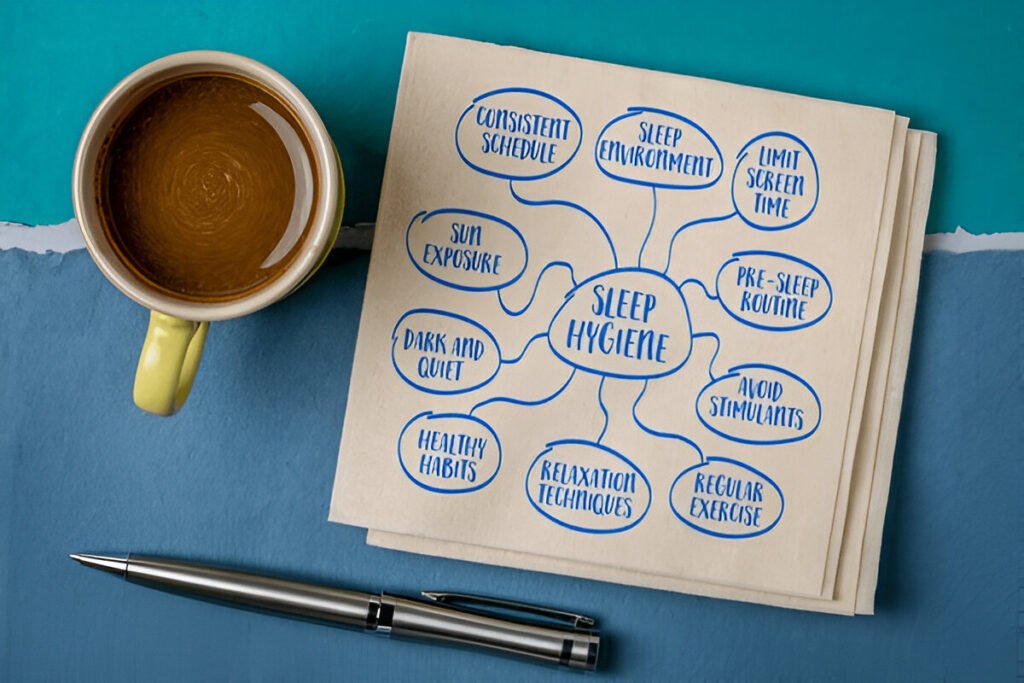Sleep hygiene refers to a set of practices aimed at improving sleep quality and overall well-being. These practices include maintaining a consistent sleep schedule, creating a restful sleep environment, and avoiding habits that disrupt sleep, such as excessive screen time or caffeine consumption. By optimizing these factors, individuals can achieve more restorative sleep, which is crucial for physical and mental health.
Mental health involves the emotional, psychological, and social aspects of well-being, influencing how people manage stress, interact with others, and make decisions. Good sleep is critical for maintaining mental health, as insufficient or poor-quality sleep can contribute to emotional instability, cognitive impairments, and heightened stress responses. Sleep deprivation can disrupt mood regulation and exacerbate mental health challenges.
The connection between sleep and mental health is well-documented, with research showing that poor sleep is linked to conditions such as anxiety, depression, and even severe mood disorders like bipolar disorder. On the other hand, maintaining good sleep hygiene supports better emotional regulation, improves cognitive function, and enhances psychological resilience. By prioritizing quality sleep, individuals can safeguard their mental and emotional health.
Understanding Sleep Hygiene
Sleep hygiene revolves around several key principles that help improve sleep quality. The body’s circadian rhythm is reinforced by a regular sleep schedule, which involves going to bed and waking up at the same time every day. This promotes uninterrupted and restorative sleep. The sleep environment also plays a critical role—keeping the room dark, quiet and cool supports better rest, while tools like blackout curtains and white noise machines enhance comfort. Establishing a pre-sleep routine with relaxing activities such as reading or mindfulness helps signal to the body that it’s time to wind down, easing the transition into sleep.
Common sleep hygiene practices also focus on reducing factors that negatively affect sleep. Limiting screen time before bed minimizes exposure to blue light, which disrupts melatonin production, while reducing caffeine and alcohol consumption prevents disturbances in sleep patterns, especially in the evening. Creating a calming atmosphere through dim lighting and soothing scents, like lavender, can further prepare the body for rest, ensuring better sleep quality and overall well-being.

The Impact of Sleep on Mental Health
Insufficient sleep has a profound effect on psychological health and frequently exacerbates mood disorders like despair and anxiety. Sleep deprivation increases emotional sensitivity, reducing the brain’s ability to regulate stress and process negative emotions effectively. This heightened reactivity can exacerbate existing mental health conditions. Furthermore, insufficient sleep impairs cognitive functions, including memory, attention, and problem-solving abilities. Over time, chronic sleep deficits can lead to brain fog, poor decision-making, and an inability to focus further aggravating mental health challenges.
On the other hand, good sleep hygiene offers substantial benefits for mental health. Quality sleep enhances mood stability by supporting emotional regulation, enabling individuals to handle stress and daily challenges with greater resilience. Studies have shown that consistent, restorative sleep can reduce symptoms of anxiety, depression, and irritability. Additionally, quality sleep improves stress management by allowing the brain to process emotions and reduce cortisol levels, the hormone associated with stress. Maintaining healthy sleep habits is, therefore, crucial for sustaining mental and emotional well-being.
Sleep Disorders and Mental Health
Sleep disorders, such as insomnia and sleep apnea, are closely linked to mental health issues. Insomnia, which involves difficulty falling or staying asleep, is frequently associated with psychological conditions like anxiety and depression. Over time, chronic insomnia can worsen these mental health issues, leading to a cycle of sleep deprivation and emotional instability. Another prevalent disorder is sleep apnoea, which is characterised by frequent breathing pauses while you’re asleep. This condition is linked to depression and cognitive decline, as disrupted sleep and oxygen deprivation negatively affect brain function.
There is a bidirectional relationship between sleep disorders and mental health problems. Mental health conditions like PTSD, anxiety, and depression can cause significant sleep disturbances, making it difficult for individuals to get restful sleep. Conversely, chronic sleep disorders often exacerbate or even trigger the onset of mental health issues. This reciprocal connection means that addressing sleep disorders can lead to notable improvements in mental health symptoms, and vice versa, highlighting the importance of integrated treatment approaches for both sleep and psychological well-being.

Strategies for Improving Sleep Hygiene
Improving sleep hygiene begins with establishing a consistent sleep routine. Going to bed and waking up at the same time every day helps regulate the body’s internal clock, known as the circadian rhythm, which governs the sleep-wake cycle. Consistency allows the body to anticipate sleep, making it easier to fall asleep and ensuring adequate rest. This routine reinforces a natural rhythm that promotes deeper, more restorative sleep, which is essential for physical recovery and mental clarity.
Creating a sleep-friendly environment is another critical strategy. Reducing noise, adjusting the room temperature to a comfortable level, and minimizing light exposure are all important steps. A quiet, dark, and cool space fosters better sleep conditions. Tools like earplugs, eye masks, or white noise machines can further enhance this environment by eliminating disturbances that could disrupt sleep, allowing for a more uninterrupted and restful night.
Incorporating mindfulness and relaxation techniques into a pre-sleep routine can greatly improve sleep quality. Practices such as progressive muscle relaxation, deep breathing exercises, and mindfulness meditation help relax the body and calm the mind. These techniques reduce physical tension and ease mental stress, making it easier to transition into sleep. By practising these methods regularly, individuals can improve their sleep hygiene and overall mental well-being.
Conclusion
Sleep hygiene is vital for maintaining mental health, as it ensures quality sleep necessary for emotional regulation, cognitive functioning, and effective stress management. Poor sleep hygiene, on the other hand, can lead to sleep disorders that negatively impact mental well-being, increasing the risk of conditions like anxiety and depression. Adopting healthy sleep practices is crucial for sustaining mental and emotional balance.
To improve sleep hygiene, individuals should evaluate their current sleep habits and make simple, actionable changes. Establishing a consistent sleep routine, limiting caffeine, and optimizing the sleep environment can significantly enhance sleep quality. These small adjustments can lead to better mental health outcomes by fostering restorative sleep and reducing the likelihood of sleep disturbances.
For those who continue to struggle with sleep despite following good sleep hygiene practices, seeking professional help is essential. A healthcare provider, such as a sleep specialist or mental health counsellor, can diagnose and treat underlying sleep disorders, leading to notable improvements in both sleep and mental health. Addressing persistent sleep issues is a key step in safeguarding overall well-being.





